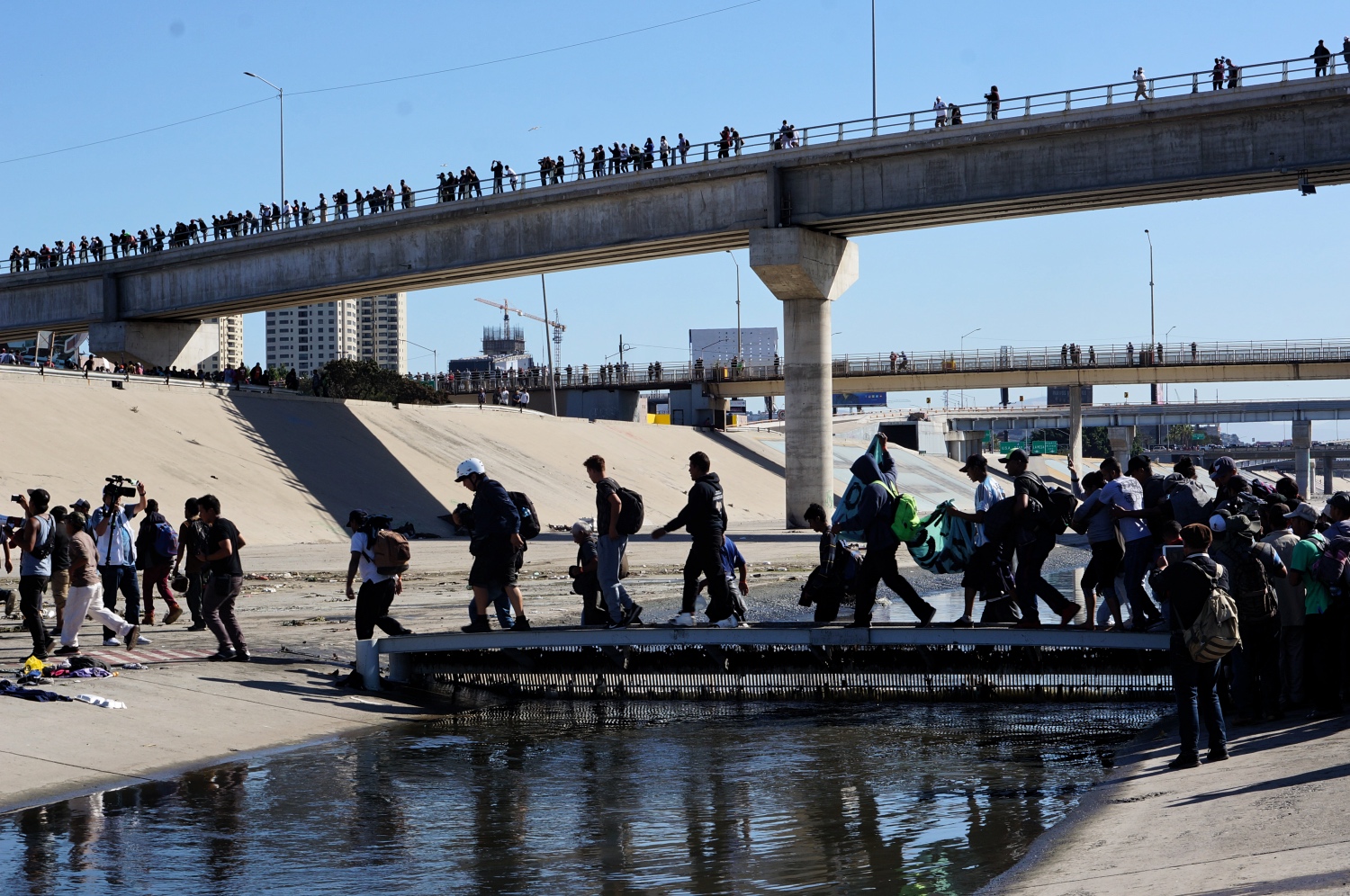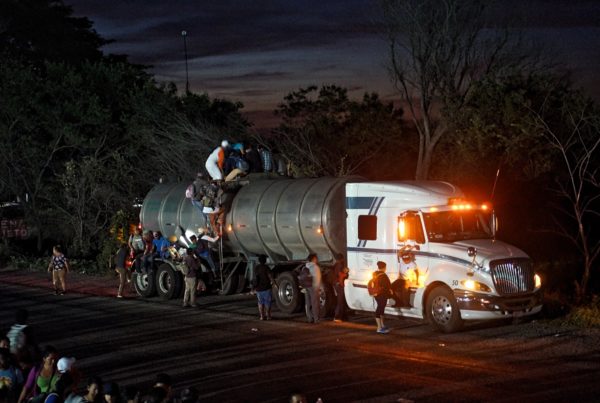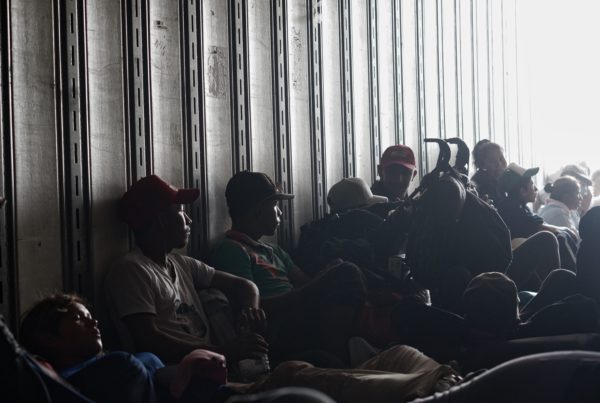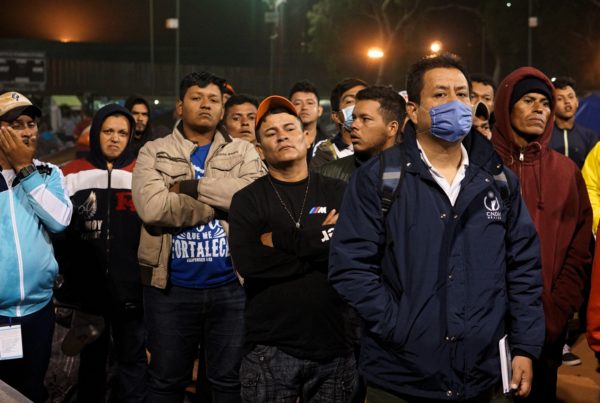The Exodus begins its march towards the border with a prayer.
“We do not come with bombs, we come with hunger.”
The Exodus, or the migrant caravan as it more widely known, is intending to peacefully walk en masse to the Mexico-USA border in Tijuana to ask the US government permission to enter the country. Perhaps it is a naive request, especially with Trump stationing troops on the border and claiming no-one will enter, but the members of the Exodus recognise their precarious position in Tijuana and the complexities involved in managing a group as large as theirs.
Thus far the members of the Exodus have been united in their singular goal to reach the United States. However, it is obvious that within a group of thousands, there will be a multitude of voices, stories and backgrounds. There are many people who want apply for asylum in the US, even if it is unclear if the US will allow members of the Exodus the opportunity. Not everyone is confident this process will work for them. Since the Exodus arrived in Tijuana there have been many clandestine, night-time attempts to cross the border. Most of the attempts I have heard of were unsuccessful. The border authorities are prepared for this.
Many people saw Tijuana as a chance to relax after the long journey north which lasted weeks and involved thousands of kilometres of travel. However, they now understand that they are a group with a time limit. They know the temporary facilities at the Sports City Benito Juarez where they are housed are overcrowded and only suitable for a short period of time. They know that the Mexican authorities and the people of Tijuana will tire of them. They themselves are tired of sleeping in plastic bag tents on the road, in the streets, under open skies. The other night a fight broke out in the camp and hordes of police arrived shouldering M16s. The overreaction is an indication that the authorities will take any excuse to exert authority over the people.
Thus far there have been mixed reactions from the people of Tijuana. On a daily basis ordinary people come to the Sports City Benito Juarez and offer free food and clothes. However, last week there was an anti-migrant protest which attracted no more than 100 people and a vulture-like media pack. Their message was amplified more by their anger and than their numbers.
“Get out you dogs,” they screamed at the families of the Exodus.
The group of adolescents I was with were shocked by the visceral emotion.
“They hate us,” they whispered to me.
There was also violence directed at the Exodus’ LGBTQI community staying in Las Playas, Tijuana.
Tijuana is a border town populated by migrants. Central American migration through Mexico and Tijuana is not a new issue. But what seems to have local people concerned is the sheer number of people arriving. Ironically, the strength in numbers that initially gave the people of the caravan security to travel through Mexico is now causing them problems on the border. The question on many people’s lips is, “how long will they stay?”
Most worrying for the people of Tijuana and the people of the Exodus is the increased attention on the border. Border closures will disrupt the economy of Tijuana and increase ill sentiment towards the Exodus. More frightening is how the border scrutiny will affect the drug cartels’ operations; namely illegal trafficking of people, drugs, and arms. Tijuana is one of Mexico’s and the world’s most dangerous cities and people trying to cross the border are particularly vulnerable to attacks and kidnapping.
With this in mind, the Exodus elected to march to the border sooner rather than later. And so, on Sunday 25 November, a collection of men, women and children gathered holding banners which express sentiments of love, religion, compassion, and pride.
“God is love.”
“Mr Trump, help us please.”
“We come in peace. We need work and security.”
By no means is everybody in the Exodus present, but there is enough people involved to have roads closed and the streets lined with staring Mexicans. There are mixed emotions from the neighbourhood: bemusement, disapproval, encouragement. The caravan marches on regardless, singing and chanting.
“Us, the migrants, we are not criminals,
We are international workers,
Why do they kill us?
Why do they murder us?
We are the hope of Latin America
Red stained are the borders.
Because it’s there, where the working class is killed.
Here we are, and we won’t go away.
And if we get kicked out, we shall come back.
Long live central America ! Long live Honduras, el Salvador, Guatemala, Nicaragua.”
The caravan walks through Zona Norte, the red light district of Tijuana, past a tent city of homeless people. Their intention is to walk across the Chaparal bridge, which crosses the Tijuana River, and camp at the border.
When they arrive at the ramp onto the Chaparal bridge a police blockade won’t let them pass. The crowd gathers at the blockade. Yesterday evening I worried about this exact situation.
“I hope for an anticlimax,” I wrote. “I hope there will not be violence. I hope there will be a standstill. I hope there will be patient waiting. I hope the young men of the caravan do not endanger the families who have provided them with cover from governments and officials. Any attacks on the border will aggravate an overwhelming response.”
The march is held up momentarily, and then some people find an alternate route. They slip past the blockade along a side street and the crowd surges after them.
“Si se puede,” the crowd chants.
The excitement builds. The crowd is imbued with a wild energy. They are challenging the authorities, the system, through the simple act of walking. The Exodus spills over the dry, concrete banks of what used to be the Tijuana River. Nowadays it is more or less a stream of stormwater filled with rubbish, an area occupied by homeless people. Women and children slide on their bums down the slope, and the crowd crosses the stormwater stream holding children and prams over their heads.
At the river, the march splits apart and loses all cohesion. Mexican police set up tactical roadblocks to try to prevent people from progressing further than the river. Most people stay at the border fence near the river. Others find gaps in the blockades, climbing trees and gates, and rushing down empty streets. Nobody knows where they are going. Each person is following the person ahead of them. Reason has been left behind. Mob mentality has taken over. After weeks of arduous journey they realise they are within touching distance of safety, prosperity, and a bright future. People whoop and shout and wave each other on in encouragement.
A bridge takes them over a crossing into San Diego. The border has been closed and the traffic is backed up. People in the cars are angry and honking horns.
Some members of the Exodus walk across train tracks, they clamber over the freight trains, and finally they reach “The Wall”. There is an iron fence on the other side of which is Mexican police. I don’t think this leads to US territory but a group of young men rattle the fence anyway. Some pick up stones. The crowd shouts at them to stop. The crowd moves on. Young men stand on top of trains waving flags urging the crowd forward. The Wall looms ahead; topped with hurricane wire and seemingly insurmountable.
A group of young men find a gap in the wall and they think they’ve entered US territory. Some immediately return, running from US authorities. A photographer friend of mine took a photo of one of the young men staring at a soldier with a raised gun. That same photographer spent 10 minutes vomiting from inhaling some kind of gas. It is later reported that 10 men were arrested.
Tear gas is fired and the smoke drifts into the crowd of women and children. It burns the eyes and throat and the children cry. Families take cover under the trains. A young boy with down syndrome has his eyes wiped by his mother.
”We do not come with bombs, we come with hunger.
The Exodus has reached the border but there is no way forward. They have no plan. They realise the power of the mob brought them here. Most of the crowd never intended to act like this. Most of the crowd urge the young men at the front to desist. The people are losing energy. Now all they can do is sit and rest. Those closest to the wall and the Mexican police try to encourage everyone forward once more but the crowd is spent. The women and children are tired.
The Mexican riot police slowly push the crowd backwards. The crowd disperses. The day is over.
On our way back, a young Guatemalan girl I know called Jenni sighs.
“How embarrassing.”
The excitement is over for now. But this is only a temporary respite. The migrants are still in Tijuana and their desire to reach the US will not be dampened by today’s activities or by the authorities refusal to discuss their requests. It is likely that they will try to reach the border again, one way or another. Each time they try a march like this they will disrupt the city and anger the local people. I am sure the tension is only going to build. Nobody is certain what will happen.



